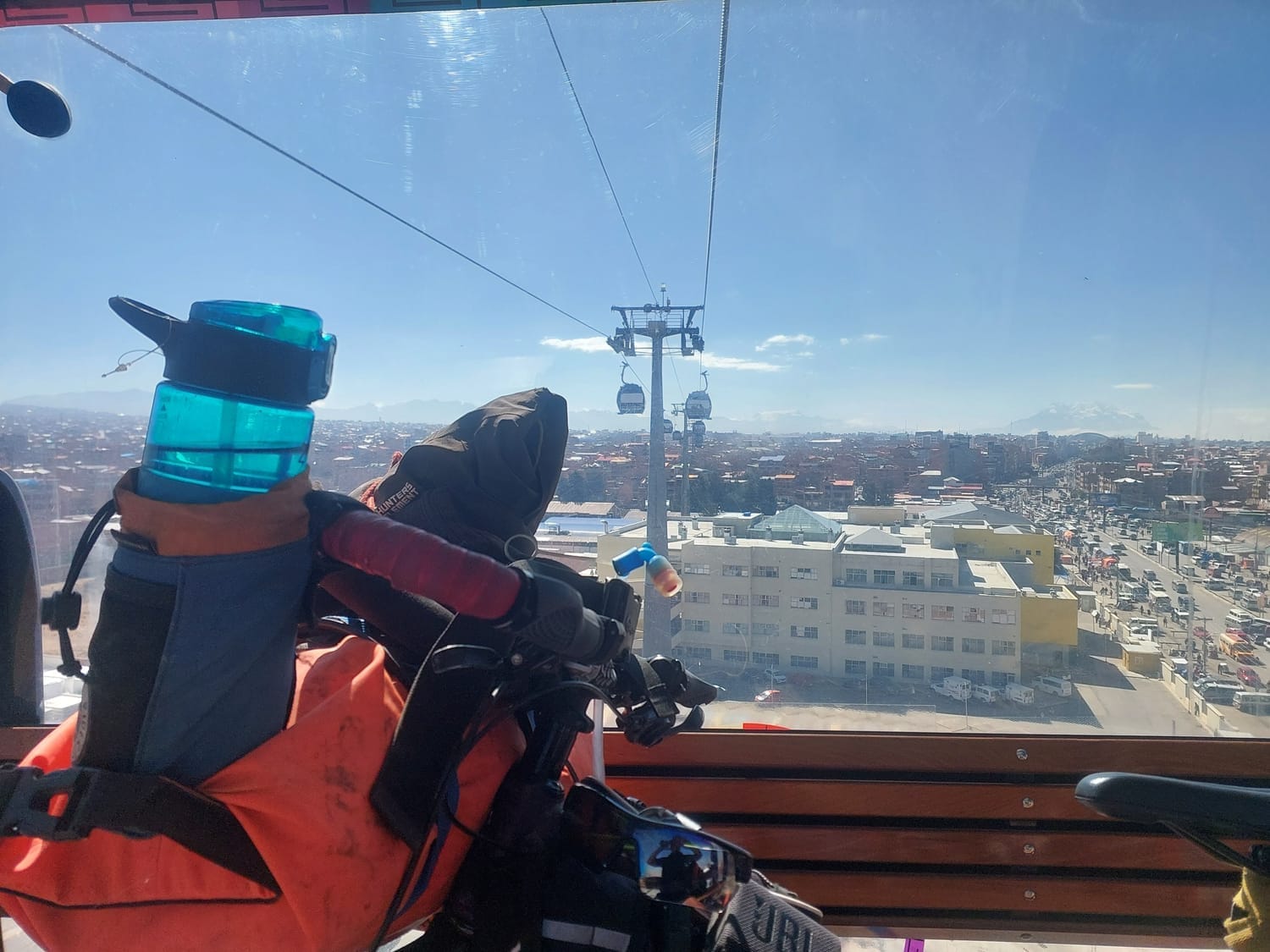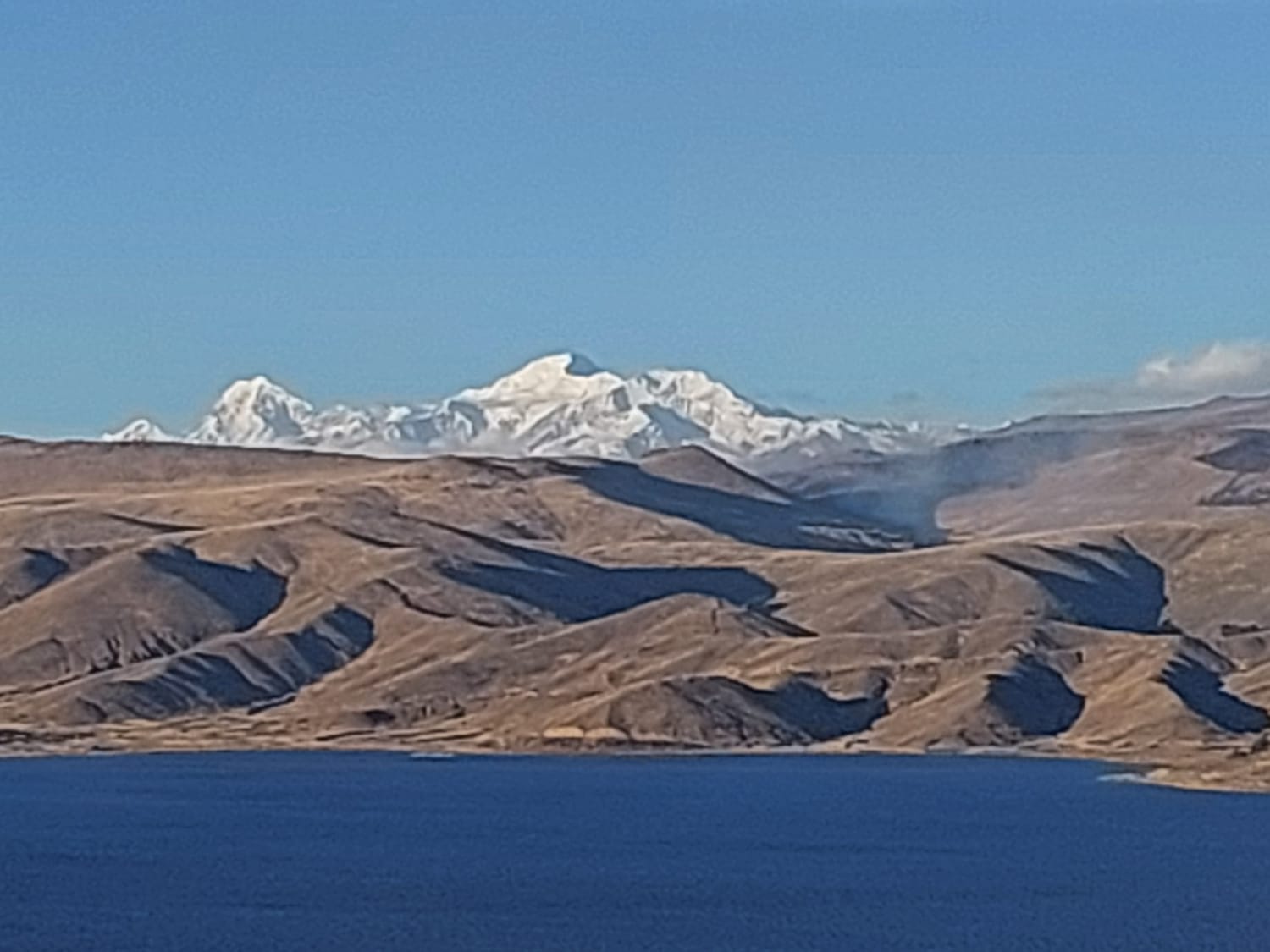Juliaca to La Paz
We pushed through alpine plateaus, the altitudes and a cold. We say good bye to Peru and hello to Bolivia.
Julianca to Puno
Today felt like the grand finale of our ride across the Andean plateau. I’ve loved every minute of the last couple of days, big skies, mountains stretching forever on the horizon, rolling hills dotted with farmhouses and scruffy little animals. It’s the sort of riding that just fills me with joy. Maree though? Not so much. Whether it’s the altitude, that dodgy chicken from the other day, or a deadly combo of both, she was struggling big time.
We’d already decided to keep it short: just a cruise into Lake Titicaca, easy, then a rest day.
While I floated along in my happy La La Land, Maree was huffing, puffing, and grinding it out behind me.
Then... salvation. A sign: Cancacho. Yesterday taught me that means roast lamb and potatoes. It was only 10am, but breakfast had long since vanished from my belly, and I wasn’t passing that up. We ducked off the road, parked the bikes in the sun, and I sweet-talked the roadside señora into a plate. Out came the goods, lamb, spuds, the works.
To top it off, the next stall had ice creams. Lamb, potatoes, and ice creams in the sun, not a bad little picnic on the side of the highway.
We needed it too, because the final stretch to Lake Titicaca wasn’t mucking around, one last climb before the lake revealed itself.
Maree rolled up ages after me, pale, breathless, and done. Luckily, I’d already booked us a hostel the night before (cheers to Wi-Fi!) so all we had to do was cruise down into town.
After dumping our gear and collapsing on the beds, we went exploring. The lakeside promenade gave me Brighton (England)vibes, kind of, but with that unmistakable Peruvian flair.
We scoped out the market for tomorrow’s Bolivia prep, grabbed a cheeky cerveza on the way back to sip on the hostel rooftop couches.
Dinner was Maree’s call, hamburgers. Cheaper here than in Colombia or Ecuador, and she had a hankering for one. I ordered some meat on a skewer with three lonely potatoes. Not exactly lamb standards, but it filled a hole.
We ordered a couple of drinks to toast Peru. A country that had tested, surprised, and rewarded us in equal measure.
Back at the hostel, we hit the hay early, same as we always do. Doesn’t matter if it’s a tent or a mattress, when the bodies say sleep, we’re gone before our heads touch the pillow.
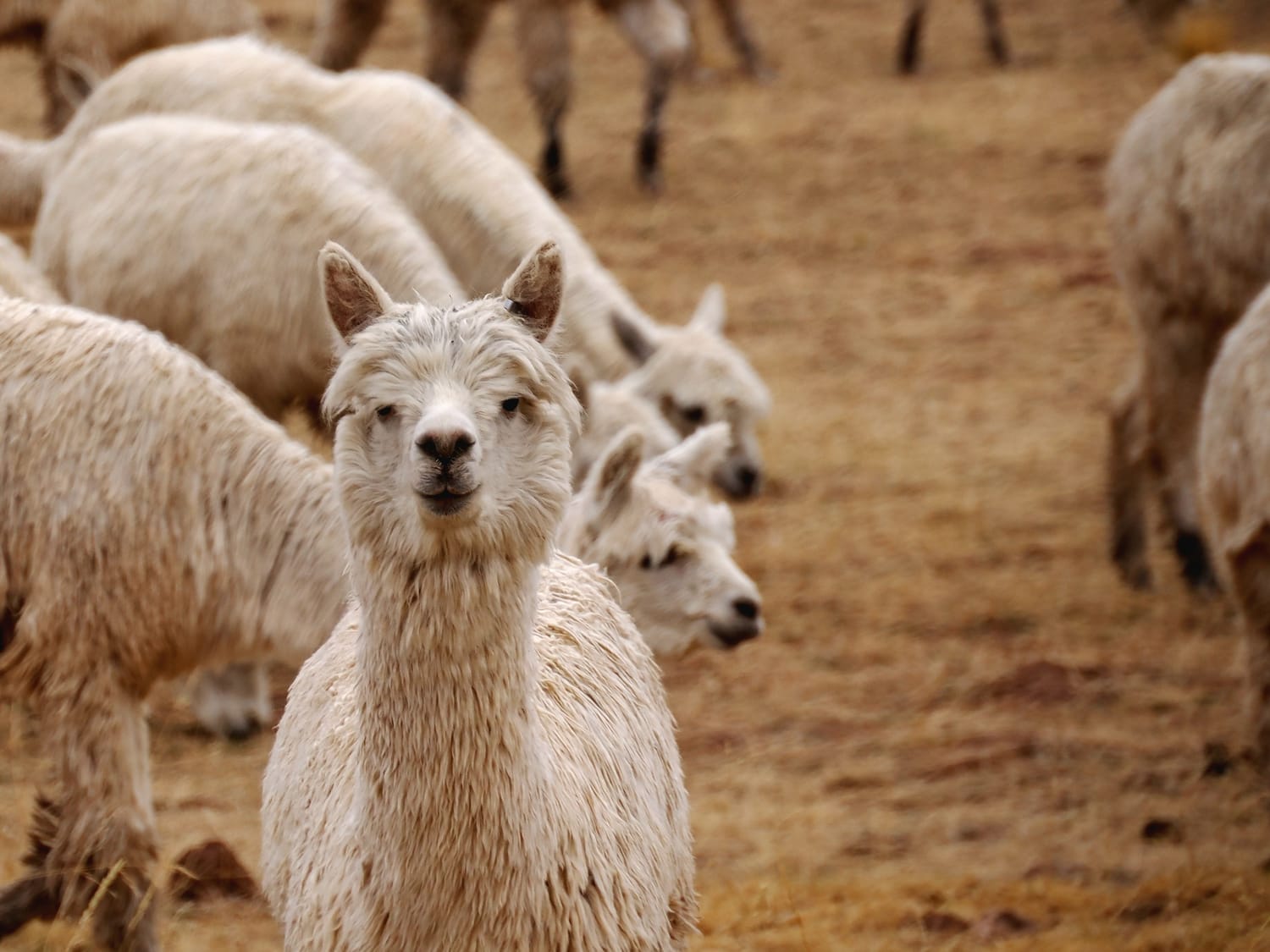
Puno - Uros
We treated ourselves to a sleep-in today — well, Maree did. My body clock still had me awake before 6am, so I plugged into a podcast and lay there while Maree snored her little altitude-fatigue heart out.
The hostel came with breakie included, and when my stomach finally protested loud enough, I pried Maree from her cocoon to come get fed. She inhaled her plate, then promptly slithered back under the covers while I pulled on my brave pants and hit the market solo for supplies.
The afternoon was our “tourist” moment, we’d booked onto a trip out to the Uros reed islands. Honestly? One of the most random tours we’ve ever done. A boat chugged us across Lake Titicaca, our guide mumbled something like, “This is Lake Titicaca, we’re going to Uros,” and that was it. No history, no culture, no wildlife yarns. Just silence until we got dropped on a floating island where a bloke gave us a sales pitch for his stall.
So Maree and I did what any knackered cyclists would do: lay down on the reeds and sun-worshipped like lizards. Bliss.
Then sales bloke talked us into an “optional” reed boat ride, extra cost, of course. We forked out, hopped aboard, and floated over to another island that had… a tiny restaurant. Same deal. We ignored the stalls, stretched out on the spongy reeds, and let the sun soak into our bones. Random? Absolutely. But peaceful too.
Eventually, our motorboat collected us and ferried us back to the Puno port. We grabbed a few more supplies on the walk home, then I hit the hostel kitchen and whipped up a mean chilli feed, perfect fuel for tomorrow.
Because tomorrow? We hit the road again, pointing the bikes towards Bolivia.
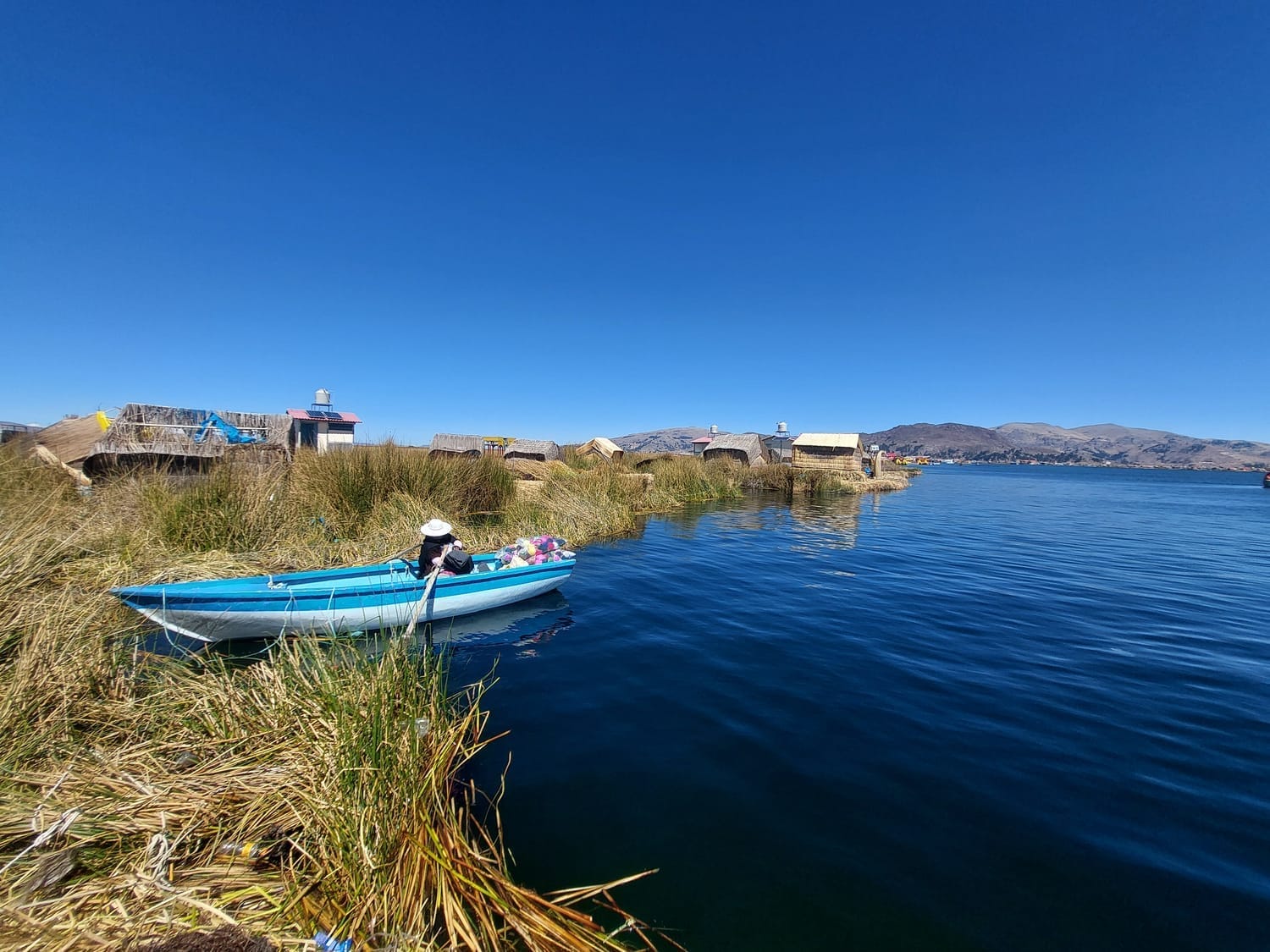
Puno to Juli
I’d been on fire all week, pedalling along in my happy La La Land, but today the tables turned. Maree, who’s been battling her way down Struggle Street lately, suddenly found her groove, and me? My legs turned to porridge.
We rolled out of the hostel and cruised the lakeshore, a gentle scenic start, but as soon as we veered inland onto the alpine plains my go-go juice was gone. Nothing. Zip. Maree surged ahead while I puffed away in her shadow.
And then the wind showed up. Not just a breeze, an ice-cold headwind that rattled the brain and shredded what little sanity I had left.
The sun was blazing but that wind cut straight through, chilling us to the bone while pushing back at every pedal stroke. At one point I honestly thought I was going to lose the plot.
The thing keeping me together was the scenery: vast golden plains punctuated by massive rock formations that looked like they’d been dropped there by giants. Tiny adobe homes, alpaca herds, and weathered farmers dotted the landscape, life clinging on in this high, harsh land.
By midday, the wind had us both on edge, so we ducked off the road. The rock walls lining the farms became our salvation, we slipped in behind one, pulled out the stove, and brewed coffee. Our little “coffee party” with bananas, biscuits, and hot brews was pure bliss, sheltered from the howling gale.
Even in zombie mode, we chewed through the k’s, and by late afternoon we saw a sign with a tent symbol. Following it led us back down to the lakeshore, and into what looked like a 1970s apocalypse beach resort. Empty. Broken umbrellas stuck in the sand, rubbish bins 1/2 buriedin sand, a row of abandoned buildings standing silent in the wind. Weird, eerie, and absolutely perfect.
We tucked the tent in behind one of the derelict blocks for shelter, and I collapsed. I didn’t even want food, that’s when I knew something was off. Maree, bless her, blew up my mat and laid out my sleeping bag. I crawled in like a wreck and called it quits.
Dinner was simple: mangoes with more mangoes, washed down with a hot chocky. Sun-baked, wind-baked, and cycle-baked, I was out like a light.
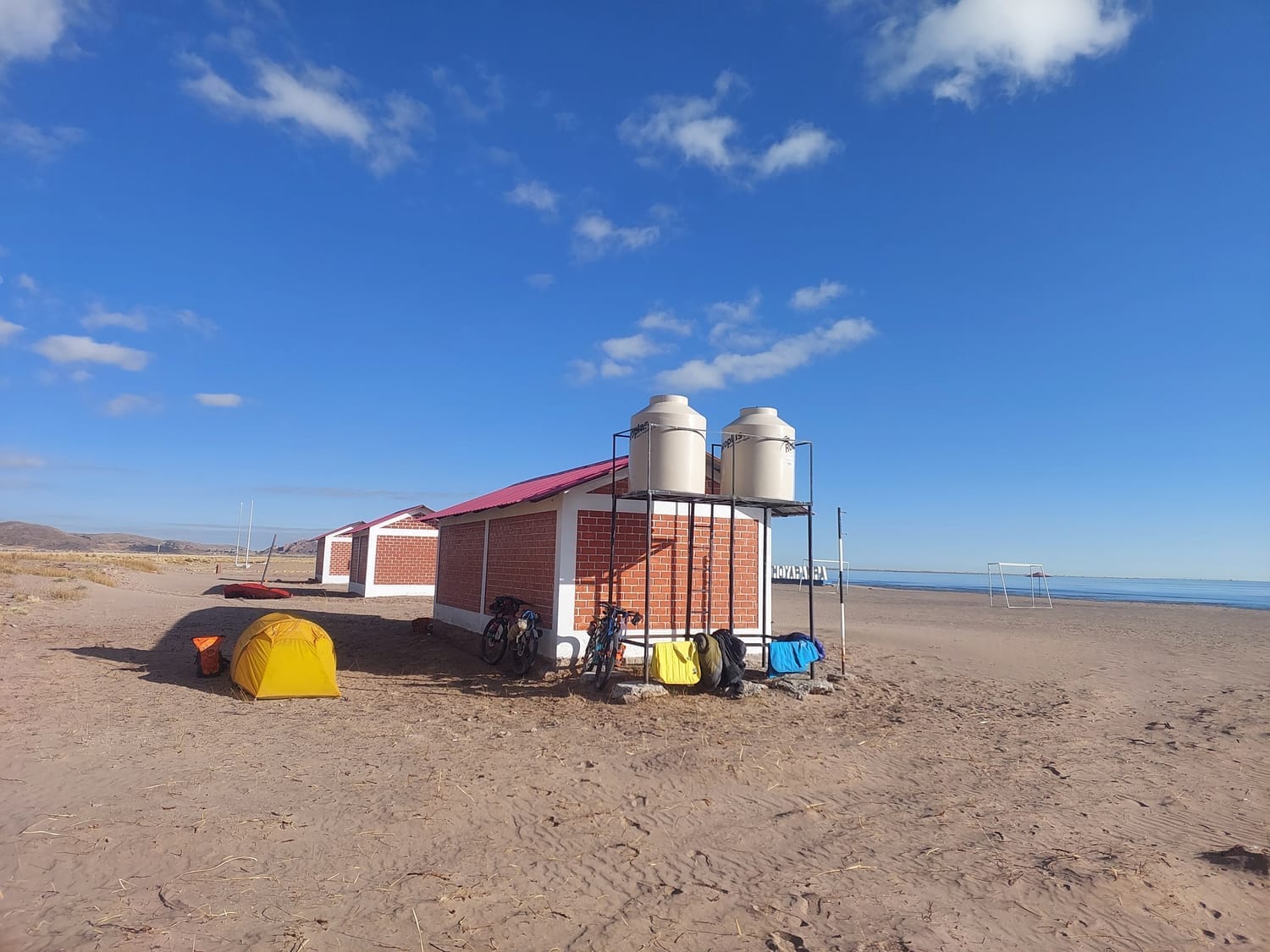
Juli to Yanguyo
We woke in our little apocalypse beach resort to stillness. The howling wind had packed up for the night, leaving a calm, golden morning. Coffee in hand, sun on our faces — not a bad way to start the day.
Trouble was, my body was still in no-go mode. Concrete legs. Zero gas. But The Show Must Go On, so we clipped in and pointed the bikes up the road. The climb was only about a hundred metres, but it may as well have been Everest the way I was crawling. At the top, salvation appeared in the form of a tiny tienda. Ice blocks in the sun, backs against the wall, sometimes the simplest pleasures feel like gold.
Of course, the peace didn’t last. By late morning the icy headwind from yesterday was back, cutting across the plateau. Cold, sharp, and relentless. We slogged through alpine flats and undulations that looked tiny on the map but felt like mountains under our tyres.
Salvation again: this time ducking behind a half-built concrete shell of a building. Out came the stove. Coffee, biscuits, fruit, another stolen pocket of calm in the chaos.
By 2pm we rolled into Yunguyo, the final Peruvian town before the Bolivian border. This was it, the last stop. We found a hostel, tracked down lunch, and swapped our leftover Soles into Bolivianos.
With the errands ticked off, so was I. We plonked down on our rickety bed, cracked a cheeky cerveza, and toasted our time in Peru.
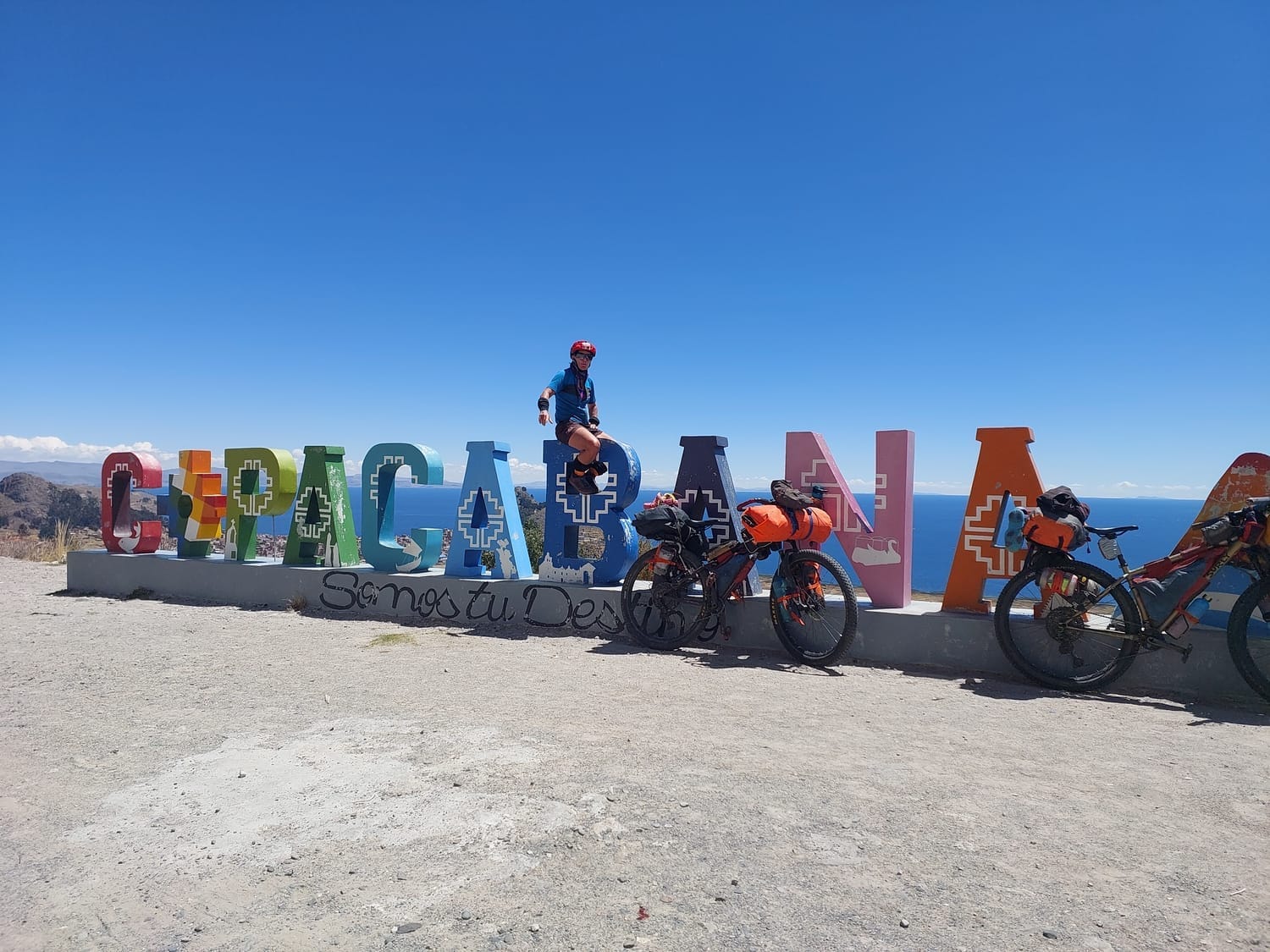
Yuguyo to Roadside camp (San Pablo) - Bolivia
The border crossing was slicker than a greased guinea pig. A quick stamp, a barely lifted eyebrow, and boom, we were pedalling into Bolivia like it was nothing.
The real welcome came ten kilometres later at Copacabana, where we demolished a breakfast big enough to feed a small army. Maree nearly wept tears of joy, her plate came with bacon. Actual bacon. First in months.
After weeks of Peruvian markets and high plains, Bolivia wasn’t easing us in gently. Today came with a 750-metre climb, wrapped in an icy headwind that felt like it had rolled straight off the snow giants in the distance.
My misplaced vest, lost way back in Ecuador, suddenly felt like a bigger crime than ever. A rain jacket turned me into a sweaty sauna, but without it the wind cut straight through. Hot, cold, hot, cold. No wonder my nose has started sniffling.
The climb itself though, bloody magic. Every bend revealed another geologist’s dream: jagged cliffs, coloured layers, and towering mountains capped in snow. We puffed, groaned, and still couldn’t stop gawping.
By twilight we’d wound around yet another endless hill, debating whether to push on to San Pablo, when we spotted it, a sneaky side track off the old road. The perfect camp, hidden from traffic, perched with a million-dollar view across Lake Titicaca, snow-capped peaks gleaming in the distance. Sold.
But of course, no day ends without drama. Earlier I’d stocked up on veggies, grabbed three shiny capsicums for dinner, or so I thought. Turned out one was a chilli from hell. Maree bit in, face exploded, and she was chugging water like it was a tequila challenge. I was laughing until I rubbed my eye with chilli fingers. Cue me rolling around on the ground, screaming like a wounded animal. Hilarious in hindsight.
Dinner eventually made it to the pot, and we sat snug in the tent, moonlight on the lake, stars scattered above, both of us still chuckling through the sting. Bolivia, you sure know how to make an entrance.
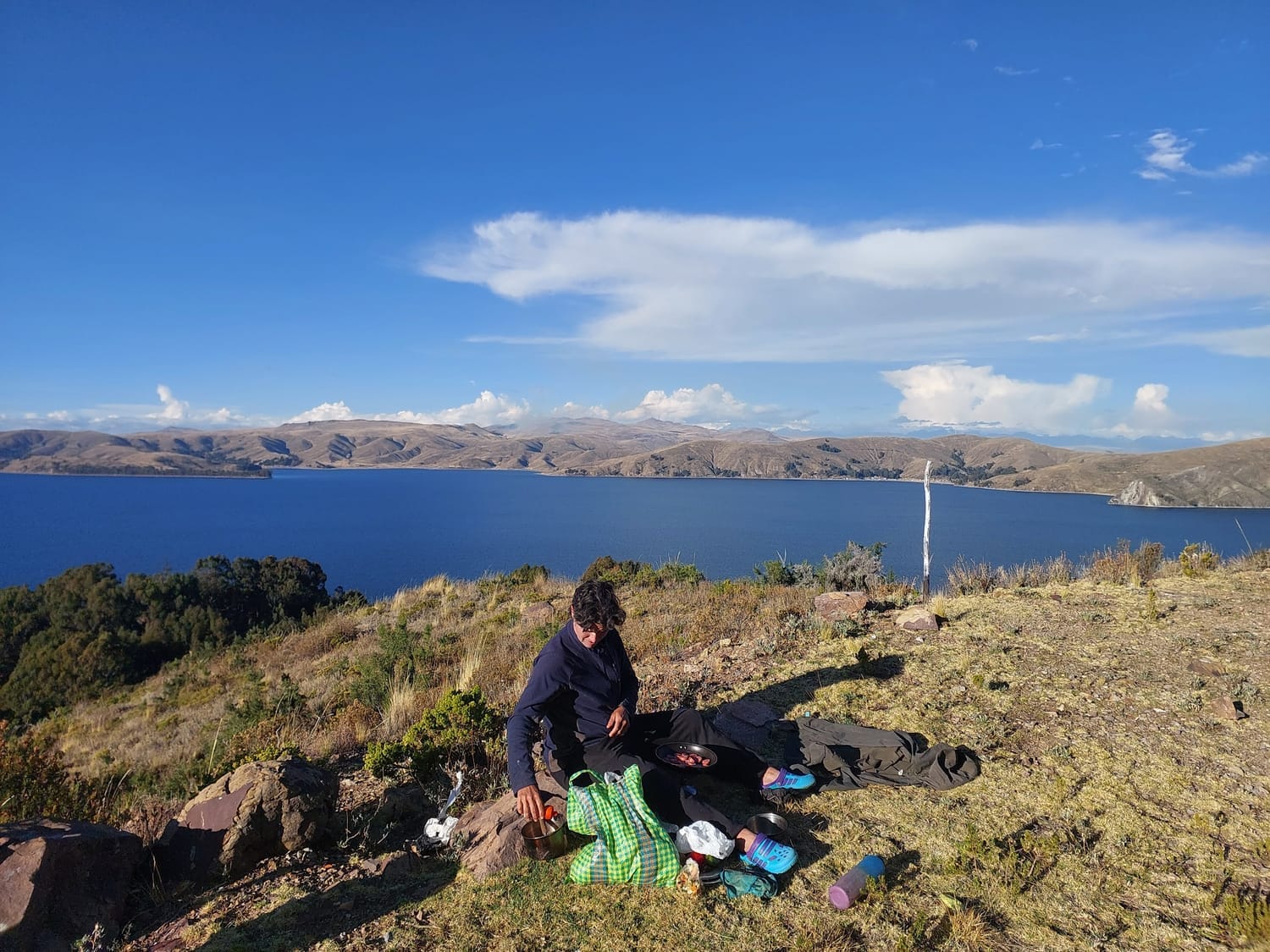
San Pablo to Brick camp (La Paz)
What a way to wake up, sun on our faces, Lake Titicaca glittering beside us, coffee warming our hands. It felt like the kind of morning that promises good things.
We rolled down to San Pablo in search of food and found salvation in the form of empanadas, greasy, golden, exactly what the legs needed. Washed down with what I’d call a banana smoothie (though the locals insist on calling it “banana jugo”), breakfast was sorted.
San Pablo had one more trick up its sleeve. The town is sliced clean in two by a channel that runs straight out of Titicaca. To cross? You don’t take a bridge, you take a barge.
Three cars, two bikes, and a handful of locals later, we floated across the glassy water, simple, slow, and strangely magical.
From there, the day became a steady rhythm: hugging the lake, weaving through villages. Each town seemed to be holding some sort of gathering, the whole community packed into the square. More than once we pedalled in clueless, sweaty, and helmet-headed, searching for food or ice cream, before realising we’d gate-crashed something important. A few awkward smiles later, we’d backtrack sheepishly, definitely the odd ones out.
By afternoon, La Paz was calling. But La Paz meant choices. We had our hearts set on seeing the Cholitas Luchadoras, the legendary Bolivian women wrestlers. Trouble is, they only perform Sundays and Thursdays. Tomorrow was Sunday. Thursday was too far off, we would probably on the road again. Which meant: if we wanted to catch the show, we had to reach La Paz tomorrow.
That left us with a problem. The main road into the city was buzzing with traffic. We were already 80km deep and shattered. La Paz was still 40km away. Push on? Or crash here?
In the end, exhaustion made the call. About 20km shy of La Paz, we ducked behind some half-built brick lots, pitched the tent, and called it a night. Last night it had been birdsong and wide-open lake views. Tonight? The lullaby of truck brakes squealing into the darkness. Not quite as romantic, but it would do.
Tomorrow, La Paz, hostels, and hopefully, women in petticoats and plaits body-slamming their way into our memories.
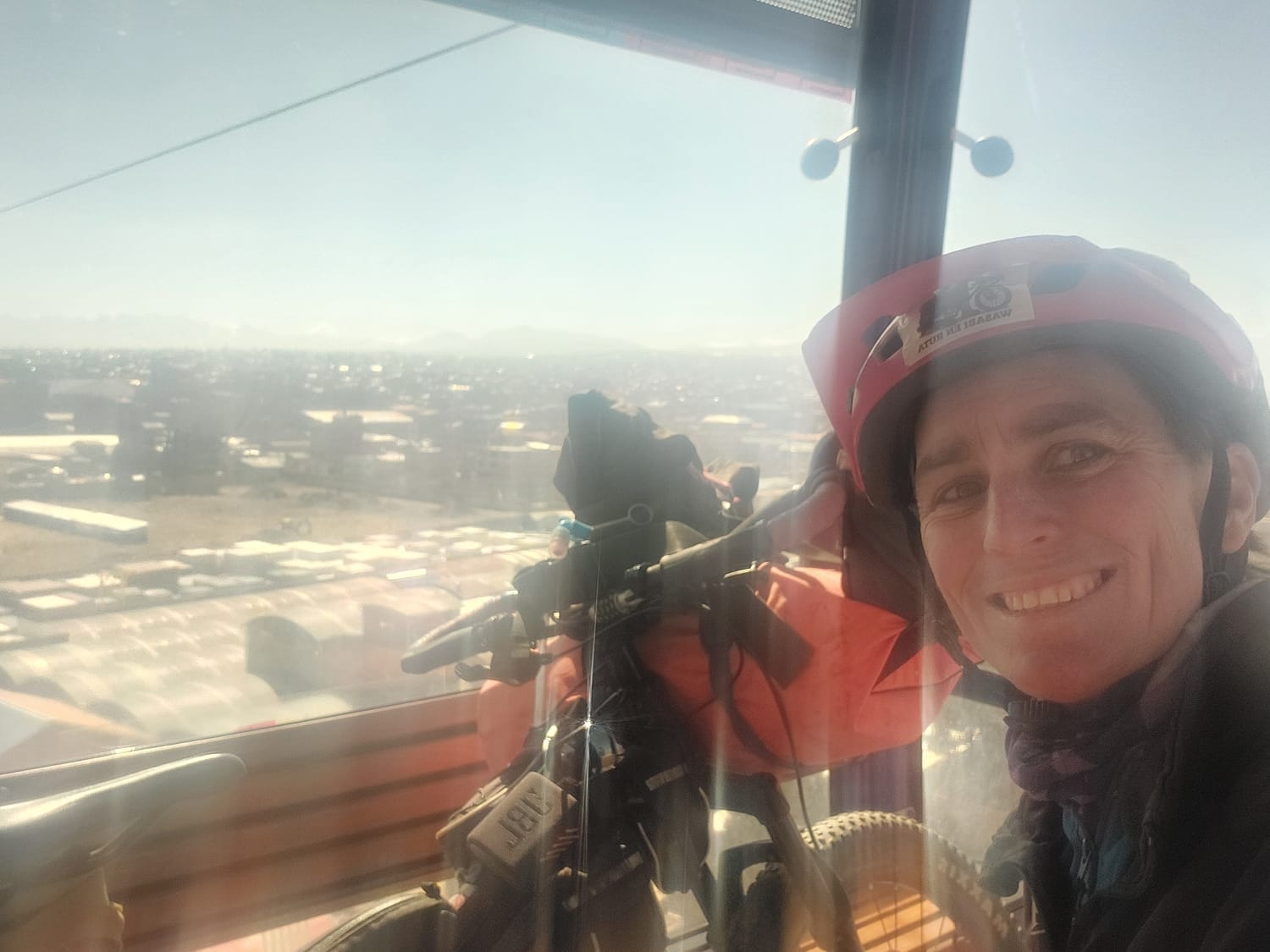
La Paz
Breakfast was nothing flash, just a couple of empanadas grabbed from a roadside stall to keep the hangry at bay. but we didn’t care. Today wasn’t about the food. Today was about Wrestling ladies!
We already love La Paz! She didn’t make us fight our way in. No endless roundabouts, no city-centre chaos. Instead, she lifted us straight into the sky. With bikes in tow, we wheeled into the cable car station, figured out the whole ticket-buying system, and suddenly we were gliding over the city like birds. Honestly, every city in the world should have these things, smooth, scenic, and a hell of a lot more relaxing than dodging buses. We just hopped line to line until we found ourselves exactly where we needed to be. Easy as.
From the final stop it was a steep push up to a hostel we’d marked on the map. By some stroke of magic, they had a room for us, four nights sorted before most people had even finished breakfast. With the bikes stashed, it was time to wander.
The streets were buzzing. A Sunday market sprawled across blocks, stalls heaving with food, clothes, knick-knacks, and the sweet smell of ice cream. Music blasted, people danced, and the whole place felt alive. We ate, we browsed, we drank coffee, we soaked it all in. But at the back of our minds was the main event: tonight was Cholitas Luchadoras.
By late afternoon, we’d scrubbed ourselves clean, stretched out for a rare bit of downtime, and then hopped on the bus to the arena. Nothing could’ve prepared us.
The show kicked off with the me, pure comical wrestling, all theatrics and body slams straight out of a WWE fever dream. The crowd lapped it up.
Then the women stormed in, petticoats, plaits, and absolute power. The energy in the place went through the roof. They were fierce, funny, and completely in control. They played the crowd like pros, whipping us from cheers to boos and back again. Maree and I were on our feet, yelling, clapping, laughing till our cheeks hurt.
It was everything we’d hoped for and more. Totally worth every aching kilometre we’d pushed yesterday just to make it here.
